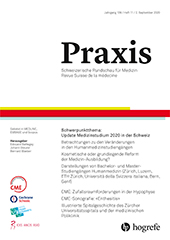Étudier la médecine humaine à l’Université de Genève: Un programme d’études intégré et innovant
Abstract
Résumé. Le curriculum de médecine humaine de la faculté de médecine de l’Université de Genève a été complètement rénové en 1995 et propose un programme d’études intégré garantissant une adaptation constante du contenu de son enseignement à l’explosion des connaissances biomédicales et aux mutations de la société, en utilisant des méthodes d’apprentissage actif, centrées sur l’étudiant-e. Conforme au processus de Bologne depuis 2006, il a été accrédité à plusieurs reprises, la dernière fois en 2019. Il s’est adapté pour renforcer l’enseignement de la médecine de premier recours et introduire des formations interprofessionnelles, notamment grâce à son centre de simulation. Grâce à une immersion clinique précoce et continue, les étudiant-es acquièrent de façon intégrée leurs compétences pratiques. Ces conditions sont favorables à l’introduction de nouveaux concepts, tels les Entrustable Professional Activities (EPAs) véhiculés par le récent référentiel national d’apprentissage PROFILES.
Abstract. The curriculum of human medicine at the Faculty of Medicine of the University of Geneva has been thoroughly renovated in 1995. It offers an integrated program allowing for a constant adaptation of the content to the explosion of biomedical knowledge and the changes in society. It uses active, student-centred learning methods. In line with the Bologna process since 2006, it has been accredited several times, most recently in 2019. It evolved to strengthen the importance of primary care and to introduce interprofessional training, in particular through its simulation centre. Through early and continuous clinical immersion, students acquire their practical skills in an integrated manner. These conditions are conducive to the introduction of new concepts, such as the Entrustable Professional Activities (EPAs) conveyed by the recent national competence framework PROFILES.
Zusammenfassung. Das Curriculum des Humanmedizinstudiums an der Medizinischen Fakultät der Universität Genf wurde 1995 grundlegend erneuert. Es bietet ein integriertes Programm, das eine ständige Anpassung des Inhalts an die Explosion des biomedizinischen Wissens und die Veränderungen in der Gesellschaft ermöglicht. Es verwendet aktive, studierendenzentrierte Lernmethoden. In Übereinstimmung mit dem Bologna-Prozess seit 2006 wurde die Medizinische Fakultät mehrfach akkreditiert, zuletzt 2019. Sie hat sich entwickelt, um die Bedeutung der Primärversorgung zu stärken und eine interprofessionelle Ausbildung einzuführen, insbesondere durch ihr Simulationszentrum. Durch frühzeitige und kontinuierliche klinische Immersion erwerben die Studierenden ihre praktischen Fähigkeiten auf integrative Weise. Diese Bedingungen sind förderlich für die Einführung neuer Konzepte, wie z.B. die Entrustable Professional Activities (EPAs), die durch den jüngsten nationalen Kompetenzrahmen PROFILES vermittelt werden.
Bibliographie
. The current curriculum in medicine at the University of Geneva. Rev Med Suisse Romande. 1997;117:65–68.
. Looking back: twenty years of reforming undergraduate medical training and curriculum frameworks in Switzerland. GMS J Med Educ. 2019;36. https://www.ncbi.nlm.nih.gov/pmc/articles/PMC6883239/
. Personal profile of medical students selected through a knowledge-based exam only: are we missing suitable students? Med Educ Online. 2016; 21:29705.
. A preclinical practice skills program. Acad Med J Assoc Am Med Coll. 1997;72:432–433.
. Design, implementation and evaluation of a community health training program in an integrated problem-based medical curriculum: a fifteen-year experience at the University of Geneva Faculty of Medicine. Med Educ Online. 2012; 17:16741.
. Interprofessional training: Start with the youngest! A program for undergraduate healthcare students in Geneva, Switzerland. Med Teach. 2018;1–5.
. Development of clinical reasoning from the basic sciences to the clerkships: a longitudinal assessment of medical students’ needs and self-perception after a transitional learning unit. Med Educ. 2003;37:966–974.
. A student-initiated, undergraduate, peer teaching skills programme. Med Educ. 2008;42:1139–1140.
. Nationwide introduction of a new competency framework for undergraduate medical curricula: a collaborative approach. Swiss Med Wkly. 2020;150:w20201.



